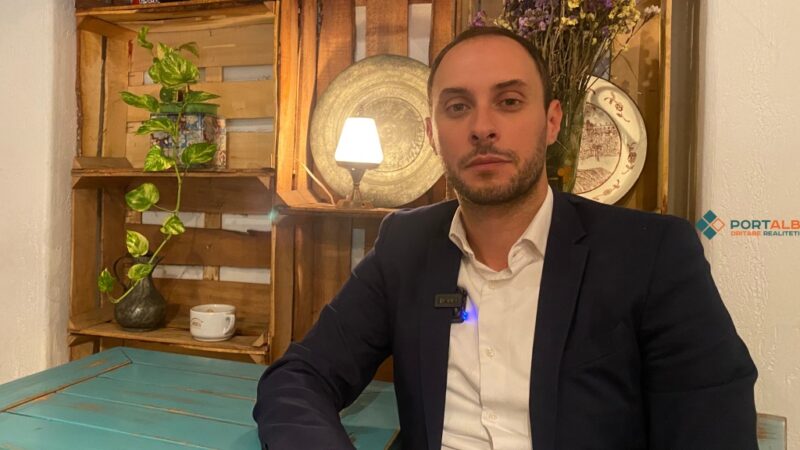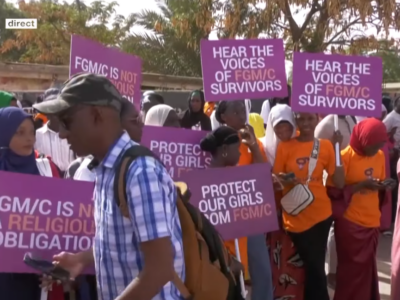Esta entrevista esta basada en la cobertura original de Portalb.mk, sitio de noticias en albanés de Macedonia del Norte. Reproducimos una versión editada bajo un convenio de compartir contenido entre Global Voices y la Fundación Metamorfosis.
Los países de los Balcanes Occidentales han abordado el reto de la digitalización de los servicios públicos a ritmos diferentes. En comparación con otros países de la región, la revolución digital de Albania comenzó en 2013 e incluía solamente 14 servicio electrónicos en ese entonces, mientras que ahora el Gobierno brinda 1225 servicios electrónicos. Traducido a porcentajes, esto muestra que Albania ha digitalizado el 95 % de sus servicios públicos, por lo cual para 2022 hubo 27 millones de solicitudes de los ciudadanos.
Esta entrevista de Portalb.mk con Aldo Merkoçi de Lëvizja Mjaft! («Movimiento Civil ¡Suficiente!”) aborda el proceso y los retos de la digitalización en Albania. Mjaft! Es la organización de la sociedad civil líder de Albania que promueve la Agenda Digital para los Balcanes Occidentales, incluido usar herramienta en línea para la asumir responsabilidades.
Portlab: ¿Cómo experimentaron los ciudadanos de Albania el proceso de transformación de los servicios de físico a formularios digitales?
Aldo Merkoçi (AM): The digitization process in Albania was relatively fast. The process officially started in 2011, but actually experienced a revolution around 2017. Somewhere around 2015, we had the first digital agenda strategy and it explained what the government wanted to do. The peculiarity of digitization in Albania is that it took place in parallel with the pandemic. Two things were combined: on the one hand, the will of the government to implement the digitization process, and, on the other hand, the urgent need arose due to the pandemic because citizens were forced to access the e-Albania portal, a portal that covers the entire digitalization process in Albania.
We should bear in mind that the case of Albania is a special case because of this combination of factors, and not that the citizens here are any more special than the rest. In this context, the pandemic was of great help for citizens to understand the process of digitization, to understand how this process helps people first, not only in the issue of reducing corruption in the state administration but as a result also for saving time and increasing efficiency.
In this context, it was well received by the citizens. Although parallel to that, there was some mistrust. The mistrust stemmed from two basic reasons. The first reason was the general mistrust that the citizens of the Western Balkans have towards their governments and politics in general. The second reason is that the digitization process requires certain additional knowledge that we had not yet learned because the citizens did not have the opportunities and mechanisms to adapt. Albanian citizens have begun to understand the importance and value of digital services, but we are still far from realizing the significance of virtual identity. A significant portion of the population still has difficulty logging in because of the knowledge surrounding the functioning of these electronic service applications.
Aldo Merkoçi (AM): El proceso de digitalización en Albania fue relativamente rápido. El proceso comenzó oficialmente en 2011, pero realmente tuvo una revolución aproximadamente en 2017. En algún momento de 2015, tuvimos la primera estrategia de la agenda digital, en la que se explicaba qué quería hacer el Gobierno. Se combinaron dos cosas: por un lado, la disposición del Gobierno de implementar el proceso de digitalización y por el otro lado, el surgimiento de la urgente necesidad debido a la pandemia porque los ciudadanos se vieron obligados a acceder al portal e-Albania que abarca todo el proceso de digitalización en Albania.
Debemos tener en cuenta que el caso de Albania es muy especial por esta combinación de factores, y no porque los ciudadanos aquí sean mas especiales que el resto. En este contexto, la pandemia fue de gran ayuda para que los ciudadanos lograran entender el proceso de digitalización, comprender cómo este proceso ayuda primero a la gente, no solamente en reducir la corrupción sino también como resultado para ahorrar tiempo y aumentar la eficiencia.
En este contexto, los ciudadanos lo recibieron bien. Aunque paralelo a esto, también ha habido algo de desconfianza. La desconfianza surgió por dos razones básicamente. La primera razón fue la desconfianza generalizada que los ciudadanos de los Balcanes Occidentales tienen para sus Gobiernos y políticos en general. La segunda razón es que el proceso de digitalización requiere algo de conocimiento adicional que aún no habíamos aprendido porque los ciudadanos no tuvieron las oportunidades ni los mecanismos para adaptarse. Los ciudadanos albaneses han empezado a comprender la importancia y el valor de los servicios digitales, pero estamos aún muy lejos de darnos cuenta de la importancia de la identidad virtual. Una porción significativa de la población tiene aún dificultad de iniciar sesión por al conocimiento que rodea el funcionamiento de estas aplicaciones de servicios electrónicos.
Portalb: ¿Cuánto ha mejorado la calidad de los servicios en el transcurso de la transformación digital?
AM: This was the key to success, in fact, for most citizens, now we are talking about services that are everyday and common. Today it is very simple, for anyone who has the means, to access the e-Albania portal. This helped in the digital transformation process as a good number saw the benefits of this work.
The reason for this is that, until yesterday, when the registration was physical, the citizen had to leave work, they had to get a permit for that, had to go to the office, then had to wait in line, and even once you get to speak to a clerk, they would orally demand additional documents, alongside other requests from the employees in the state administration. Now, this whole process of taking leave from work, waiting in line, and having doubts about what documents need to be prepared in advance, has been digitized. Moreover moving the service online eliminated the “custom” attributed to the “Balkan mentality” which included leaving “tips” for state administration employees when a service is performed. And these “tips” were not insignificant amounts [like one would leave for a waiter], but amounted to small bribes.
These are the first steps that gained the trust of the citizens. In this context, it is evident that the service is better, faster, and more reliable, and there are no doubts about the system.
On the other hand, the fact remains that everyone can already get these services, and the big question remains: how safe are the citizens?
A great effort must be made to enable a section of the society that has no means to obtain this service. It remains an open debate, and we continue to insist that this should be studied further.
AM: Esta fue la clave del éxito para la mayoría de ciudadanos, estamos hablando de servicios que son cotidianos y comunes. Para quien que tenga los medios, ahora es muy simple acceder al Portal e-Albania. Esto ayudó en el proceso de transformación digital cuando un buen numero de personas vieron los beneficios de este trabajo.
La razón de esto es que, hasta ayer, cuando el registro era físico, es que el ciudadano tenía que dejar su trabajo, conseguir un permiso para eso, ir a la oficina, luego tenia que esperar en una fila, y una vez que se conseguía hablar con el recepcionista, le exigiría documentación adicional, junto con otros requerimientos de los empleados en la administración del estado. Ahora, todo este proceso de tener que dejar el trabajo, esperar en fila y tener dudas acerca de qué documentos necesita tener preparados con anticipación está digitalizado. Además, llevar el servicio en línea elimino la “costumbre” atribuida a la “mentalidad balcánica” que incluía dejar “propinas” para los empleados de la administración del Estado cuando se prestaba un servicio. Y estas “propinas” no eran cantidades insignificantes (como las que uno le dejaría a un mesero), sino que equivalían a pequeños sobornos.
Estos son los primeros pasos para ganarse la confianza de los ciudadanos. En este contexto, es evidente que el servicio es mejor, más rápido y más confiable y que no hay dudas del sistema.
Por el otro lado, el hecho es que todos pueden ya acceder a estos servicios, y la gran pregunta es: ¿qué tan seguros están los ciudadanos?
Se debe hacer un gran esfuerzo para habilitar a una sección de la sociedad que no tiene los medios para obtener este servicio. Sigue siendo un debate abierto, y seguimos insistiendo que esto debería estudiarse mas a fondo.
Portalb: ¿Hasta qué punto estuvo involucrada la sociedad civil en este proceso y que tan importante fue realmente su influencia?
AM: I will refer back to the pandemic again because most of the digital structure was created in 2020 and 2021. In those two years, we may have been conditioned by the pandemic. What happened was that on the one hand the government urgently needed a digital infrastructure. On the other hand, the pandemic conditions also reduced the ability of civil society, to participate in the process of building this structure.
The combination of these things resulted in some unfortunate decisions. The government decision to disable physical access to counters in government institutions was met with disagreement from civil society. This happened because of the fact that infrastructure was built, with few consultations with and little consideration for the opinions all stakeholders.
Since 2019, through the ICEDA program, we at Mjaft! have been both monitoring the situation and giving specific advice to the institutions involved, mainly the National Agency for Information Security. Our recommendations also addressed all institutions, the way they are interconnected, until the moment the government issued a decision to close the counters.
To increase the participation of civil society in the process of digital transformation and implementation of the Digital Agenda, during the last three years we invested much not only in increasing our own knowledge, but also gathered knowledge and information from our partners in the field. We established a network composed of investigative journalists and local organizations that work in other cities, because these issues don't affect only the capital Tirana. The input from this pioneering network enabled us to see the dynamics more clearly. It was important for us to identify the problems and then convey the needs of the citizens to competent institutions.
AM: Me referiré de nuevo a la pandemia porque la mayor parte de la estructura digital fue creada en 2020 y 2021. En esos dos años, pudimos haber sido condicionados por la pandemia. Lo que pasó fue que, por un lado, el Gobierno necesitaba urgentemente una infraestructura digital. Por otro lado, las condiciones de la pandemia también redujeron la capacidad de la sociedad civil de participar en el proceso de construir esta estructura.
La combinación de esto resulté en decisiones desafortunadas. La decisión del Gobierno de deshabilitar el acceso físico a los mostradores de las instituciones gubernamentales se recibió con desacuerdo en la sociedad civil. Esto paso por el hecho de que la infraestructura se construyó con pocas consultas y con poca consideración por la opinión de todas las partes interesadas.
Desde 2019, a través del programa ICEDA, en Majft! hemos estado supervisando la situación y dando consejos específicos a las instituciones involucradas, principalmente para la Agencia Nacional de Seguridad de Información. Nuestras recomendaciones también se dirigieron a todas las instituciones, cómo están interconectadas, hasta que el Gobierno emitió la decisión de cerrar los mostradores.
Para incrementar la participación de la sociedad civil en el proceso de la transformación tecnológica y la implementación de la Agenda Digital, durante los últimos tres años hemos invertido mucho, en incrementar nuestro propio conocimiento, y también hemos acumulado conocimiento e información de nuestros socios en el campo. Establecimos una red compuesta de periodistas de investigación y organizaciones locales que trabajan en otras ciudades, porque estos problemas no solo afectan la capital, Tirana. El aporte de esta red pionera nos permite ver las dinámicas más claramente. Fue importante para nosotros identificar los problemas y luego comunicar las necesidades de los ciudadanos a las instituciones competentes.
Portalb: ¿Cuál es actualmente el mayor reto que enfrentan los ciudadanos albaneses en el proceso de digitalización?
AM: There are two main things. First of all, we need to make sure that all Albanian citizens have the opportunity to access it, and when we talk about this, we are not only talking about access to the internet, but about access to be able to get this service. The second has to do with security because the more services we provide to citizens or business profiles, the better. But parallel to this, as the number of services increases, as it is today, where we have more than 1,200 services, the moment your virtual profile as a citizen is hacked by someone else, then you are much more vulnerable than yesterday.
As the last case showed, we had a cyber-attack from Iran, and one thing we learned is that your security depends on how dangerous your enemy is. In this case, we did not understand the case of a big enemy like Iran, this was a message to the whole region that our defense system must be better and we must unite our defense system when it comes to cyber security.
AM: Principalmente hay dos cosas. Primero, necesitamos asegurarnos de que los ciudadanos albaneses tengan la oportunidad de acceder, y cuando hablamos de esto, estamos hablando de tener acceso a internet, y sobre el acceso para poder obtener este servicio. Lo segundo, tiene que ver con la seguridad porque entre más servicios demos a los ciudadanos o perfiles comerciales, mejor. Pero paralelo a esto, a medida que aumenta la cantidad de servicios, como ahora, cuando tenemos mas de 1200 servicios, en el momento que alguien hackee tu perfil virtual como ciudadano, serás mucho más vulnerable de lo que lo eras ayer.
Como se mostró en el ultimo caso, tuvimos un ciberataque desde Irán, y una cosa que aprendimos es que tu seguridad depende de qué tan peligroso sea tu enemigo. En esto, no entendimos el caso de un gran enemigo como Irán, este fue un mensaje para toda la región de que nuestro sistema de defensa debe ser mejor y que tenemos que unir nuestros sistemas de defensa cuando se trata de ciberseguridad.







